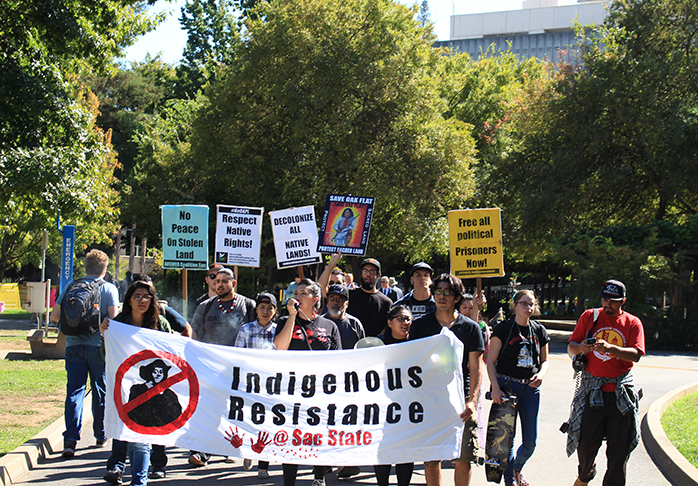Correction: Oct. 14, 7:06 p.m. This post has been updated to reflect that the chalk messages were removed for violating the school’s posting policy, according to Sacramento State director of news and communications Elisa Smith.
About a dozen students marched from the library quad to the administration building Monday afternoon, protesting the continued celebration of Columbus Day and seeking to draw attention to issues faced by Native Americans.
“We did this to open up a space here to talk about the Native (American) issues going on right now,” Sac State student Denise Fernandez said. “It’s not just the Dakota Access Pipeline; it’s a lot of issues in terms of treaty, in terms of land grabs, in terms of indigenous people being discriminated against in their own country.”
Fernandez was representing Students for a Quality Education, an activist group that organized the protest alongside Movimiento Estudiantil Chicano de Aztlán, or MEChA, a nationwide Chicano student advocacy group, and Ensuring Native Indian Traditions, or ENIT, a student club.
Columbus Day, which celebrates Christopher Columbus’ arrival in the Americas in 1492, has been a federal holiday since 1935 and falls on the second Monday in October.
The celebration has come under criticism in recent years due to the brutal treatment of American Indians by Columbus and during the colonization of the Americas, with some cities and principalities replacing the day with Indigenous Peoples’ Day.
The protest began in the Library Quad with a prayer, the burning of sage and impromptu speeches from students sharing their thoughts not only on Columbus Day, but on the government, capitalism and education.
Brooke Ford, a junior at Sac State, spoke in the quad, saying that modern American society doesn’t appreciate traditional Native American ways of life.
“You want your people to survive for seven more generations so you’re not going to sit there and exploit every resource you possibly can out of the area you are living in so that you cannot survive there anymore,” Ford said.
Ford said that she visited the Standing Rock Indian Reservation, where thousands of people are protesting the planned construction of an oil pipeline that American Indians say will disturb their sacred lands and harm drinking water.
“When I went up to Standing Rock that opened up my mind to everything that’s going on,” Ford said. “I can’t just sit here and allow the injustice to continue.”
After chanting and marching to the administration building, the protesters continued to speak.
The students were also upset by the removal of messages in chalk on the ground near the library, which school officials initially said was due to chalk dust getting into the building. Director of news and communications Elisa Smith later clarified that the messages were removed for violating the school’s posting policy.
“That troubled me and I feel silenced as a student — not just my voice but the voice of everyone else,” Fernandez said. “I think it’s a testament to how they react to the students rising up.”
Jamier Sale of Students for a Quality Education and Students for Justice in Palestine said that he feels that American history courses obscure the truth. He spoke directly to Sac State President Robert Nelsen, who was listening while sitting on a nearby bench.
“Hopefully he can get back to work representing us as the students so that hopefully we have less Eurocentric narratives in our classroom,” Sale said. “We get taught false history every single day. I don’t see it as the decision of one person, but it’s the system.”
Sale reminded the demonstrators about an incident last year when a student claimed that she was ejected from class for arguing with history professor Maury Wiseman, who said that atrocities against American Indians did not amount to a genocide.
“(Wiseman) was basically speaking lies,” Sale said. “How long are we going to have our professors in here saying whatever they feel that doesn’t have to stand up to any kind of academic scrutiny?”
For his part, Nelsen said that he came to watch the protest in order to get a pulse on what students on campus are thinking.
“I always come out to see the students speak, what they’re interested in and what’s important to them,” Nelsen said. “We knew it was a scheduled protest that was there and so I came out just like when Black Lives Matter was having their speak out.”































































































































